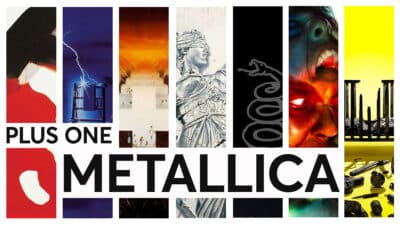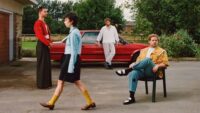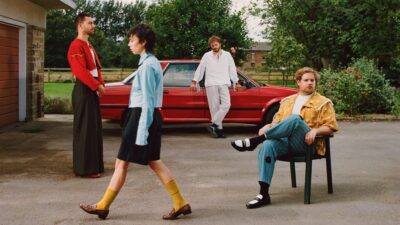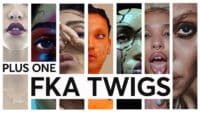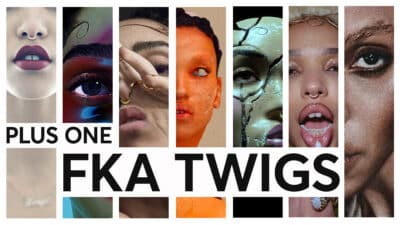Interview
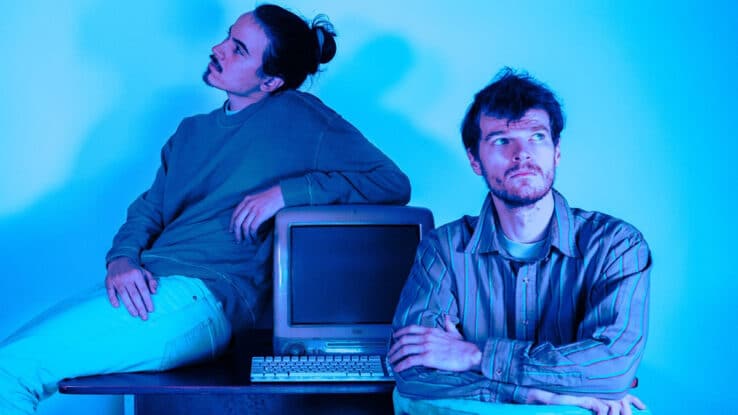
Interview
Origami Angel: “Some of the realest moments come in the silliest ways”
Ryland Heagy reflects on the D.C. duo’s explosion onto the emo scene, and the inspiration behind their vital latest album
With a sound that’s as complex as it is playful, blending heartfelt vulnerability with relentless energy, over the last few years Origami Angel have become a force to be reckoned with.
Exploding onto the scene with their 2019 debut full-length Somewhere City, the Washington, D.C.-based duo – comprised of vocalist/guitarist Ryland Heagy and drummer Pat Doherty – have forged an identity that intrigues as much as it inspires. Effortlessly veering from searing alt. rock riffs and punk melodies to jazz sections with mathcore flourishes that culminate in metalcore breakdowns, their shapeshifting sound was cemented on 2021’s 20-track epic GAMI GANG, inviting fans into a whirlwind of whiplash-inducing genre-blending anthems.
Balancing catchy hooks with a darker, reflective side, earlier this year the duo unleashed their most ambitious record to date. Delving into the challenges of our increasingly digitised world, Feeling Not Found explores the sense of disconnection felt throughout humanity in a post-pandemic age. Partially written in the solitude of lockdown and developed as the world’s new realities unfolded, it tackles heavy themes through a lens that’s both introspective and socially aware, distinctly coloured by the duo’s signature humour and light-heartedness.
As they prepare to bring Feeling Not Found to UK audiences on their biggest headline tour yet, Origami Angel are setting out to create a space where catharsis, humour, and introspection can harmoniously coexist. Ahead of a huge 2025, Heagy takes us through the band’s journey so far, the inspirations behind their unique sound, and how they’re seeking to forge a community that thrives on both empathy and energy.
It’s been a huge few years for Origami Angel, and it feels as though this project has grown exponentially since GAMI GANG. Coming into album three, where were your heads at?
It was interesting, because the writing of this album felt pretty free and disconnected from the idea of any perception. We started the writing in early lockdown, and I think there was a lot of freedom there because it happened in isolation. However, when it came to figuring out the production of it, the recording, and where we wanted it to be sonically, it required a lot more technicality than we had at our disposal. It needed a lot more attention to detail, and I never really thought we would have a platform to showcase an album like that. After Somewhere City though, that became our reality. I became focused on making sure that this was the best possible presentation of these songs, because we were really excited about them. We had them written, but we needed to become better musicians. Now, both Pat and I have improved a lot, so we were able to make sure that the record was done to the best of its ability. We took our time, and I’m really grateful for that. We did everything that we needed to.
It’s only been three years since GAMI GANG was released, but a lot has happened in the world since then. Feeling Not Found delves into the complications of the world becoming increasingly digitised, and how disconnected and confusing it can be to navigate that. Where did the idea for the concept come from?
It started during early COVID. For my entire life, I have been looking for a community that I fit into, and before the pandemic it felt as though I finally found it. We put out Somewhere City, and we were doing these awesome DIY shows. I was doing what I always wanted to do with my life, playing in bowling alleys and tattoo parlours to a bunch of kids. Then, overnight, that was stripped away. I realised that I may never have that feeling again, and we may never play a show again. It was this cognitive dissonance for me, and that became the roots of the record.
Over time though, we saw the consequences of the change that had happened. We saw the impact it had not only the music industry, but how everything has become digitised. There’s a lot of humanity that has been lost as we’ve moved forward, and that added a whole other voice to the record. As time went on, the issues became more transparent and increasingly bad. These things that are connecting me to the world, my phone and my computer, are made using materials sourced in the most unethical ways. It’s destroying our planet, and they’re not even hiding it anymore. With the amount of time spent on this record, there are parts rooted in a selfish isolation, but also parts that voice a selfless isolation.
You’ve almost ended up with this conversation taking place between the past and present versions of yourself…
It was important for the record’s narrative to highlight that internal conversation, which is different from records that we’ve done in the past. On our first two records, there are multiple perspectives that I try to tap into, but this one is very focused on the internal. There’s not a lot of dialogue to an external or to a proverbial you on this record. The only time it gets into that is on ‘Wretched Trajectory’, but even then, it’s still in search of solving the inner voice’s crisis. I’m grateful that we had the time to process everything that we were trying to do because, unfortunately, it became more real than I ever intended it to be. The record started out as a metaphor, but it ended up being the most in-touch-with-reality record that we’ve ever released.
The freedom of time is a huge factor in how this album came to be, but it also helps that you were able to work with a GRAMMY nominated producer. What was it like to have Will Yip on board?
Will has always been one of my heroes. You always hear that you should never meet your heroes, and I might even subscribe to that idea, but if that guy’s your hero… You should meet him. He is the most positive musical force I’ve ever met, and I was experiencing such mental turmoil through the process of creating this record. There were things going on in my life that were making it hard to focus on the music, but when we linked up with Will, everything made sense. When you step into Studio 4 for the first time, you’re in this legendary space, stood next to a producer who has earned every right to be the biggest superstar in the world. However, he’s the most humble and down-to-earth man imaginable. I don’t think that this record would have the voice that it has without him, because he is the master of sonic intensity. He is the master of capturing the catchiness of a hook, but also a master of the darkness. Whether it’s Code Orange or Balance And Composure, he’s able to make that darkness an identity for a band. He uses the space so carefully, and he can add a whole other dimension to the records he works on. I’m so grateful that we got to work with him, but I’m even more grateful that this person that I’ve looked up to all my life is actually the real deal. He’s such a good guy, and someone I’m so lucky to call one of my best friends now. It’s been a dream come true to work with him, and he’s helped us in more ways than just the music.
For those uninitiated to the Origami Angel sound, this record is a whiplash of an introduction. Have you always been drawn to the potential of sonic juxtaposition, of being able to write songs that flit through genres, time signatures, and styles so swiftly that it’s impossible for anyone to pin down?
When we were in our EP era, it was very hard for me to commit to it because I didn’t feel confident enough in my own songwriting. When we wrote ‘ROM Hack’ though, that was our first venture into that. You might not even be able to hear it, but I remember doing this twinkly guitar part in the intro whilst Pat was playing a post-hardcore drum beat. That was the foundational piece that we wrote on, and through the EP we began throwing in some more curveballs just because it felt right.
We explored that idea more on Somewhere City, and then on GAMI GANG we took it to the next level. We experimented so much on that record, throwing everything at the wall to see what stuck and what didn’t. We learned so much, and coming out of that album it felt like we could do anything. Now, we’ve done that so much that we’re almost doing it when we’re not doing it. If we decide to stay in the same vein or mood throughout a song, like we do on ‘Viral’, that’s almost a statement in itself. Now, if we stay in the same lane, it’s also exciting. As a songwriter, that’s so much fun to play with, especially when we’re creating a live set. We’re able to use these different moods to keep it exciting for the crowd, but more importantly, to keep it exciting for us. We have jazz parts, breakdowns, pop hits, party punk, and two-step drum lines. It’s so fun to be able to create those different moods throughout a set, because it keeps us engaged.
Whilst there are lots of technically impressive aspects of Origami Angel, fun is always at the top of the agenda. The album’s tracklist is filled with in-jokes, references, and double entendres… Is it important to you that a silliness and goofiness always remains at the core of this project?
At this point, it’s become a voice and part of our identity. What I love about being in this band is that some of the realest moments come in the silliest ways, and that’s often something that is beautiful about life. GAMI GANG opens with a trap beat, and at the time you don’t think about it too much. Twenty songs later though, that melody comes back under a different chord. When it resurfaces, that melody becomes beautiful, and it tugs at your heartstrings. I love moments like that, where you don’t realise how beautiful something is until it’s placed into another context. When you recontextualise it, it ends up being the most poignant part of the record.
I love to be able to dabble in both silliness and seriousness, because if it’s serious all the time, are we even going to smile at the show? This record ebbs and flows through moody parts, angry parts, and dance-y parts, and those are all moods that came to me through isolation. Everyone has experienced those things in the last four or five years, and it’s fun to be able to utilise those different emotions and voices.
Something that differentiates Origami Angel from a lot of other artists in the scene is the fact that you’re a two-piece. You handle both guitar and bass duties in the studio, but how do you make that work within your live show?
I encourage people to come to the show and hear it, because there are no bass tracks at all. We do use some track elements for synth stuff, but every main vocal, guitar, or drum that you hear during an Origami Angel show is all happening onstage. There are so many cool vocal parts on this record, and in the past, we may have used a track, but now I’m actually programming vocoder alongside the set. That means that I can sing those parts with chords over the top of them, but it’s still my voice.
We used the vocoder on the first song of this record, and it fits into the identity of where we are as a band now. Origami Angel has always existed at the crossroads of technology and musicality, and that’s what’s really interesting about the new record. I’ve put so much effort into being able to perform bass off of my live guitar, and I have a bunch of crazy processing going on in my rig. It would be a lot easier if we just threw everything onto the track, but that’s not what the identity of band is. It’s important that the music is right in front of you, and I want to be the guitarist with the biggest sound on earth. That’s why I wanted to start this band, and it’s evolved so much, but I’m really proud of what it has become. When people come to our shows, they often tell us how full it sounds. I appreciate that, because I’ve been working on this for nine years now. To see people at the show acting as if there were twenty musicians on that stage when it’s just Pat and I is incredible. That’s our identity, and it always will be. I love the challenge.
It’s an exciting time for Origami Angel right now, but it’s also a very exciting time for the scene as a whole. There’s such a positive community around this music, and that makes for an incredible atmosphere at shows. What has it been like to see the community around Origami Angel grow, and to see how crowds react to what you’re doing?
It’s so special, but it’s still hard for me to process. I love to see people resonating with any piece of art, but when it’s ours that’s even more incredible. There are people who have taken such deep meaning from our songs, and it’s so special to see people emotionally connect to our music. That’s why we do this. On a wider level though, the scene as a whole is in a great place. Emo is bigger than it’s ever been in my lifetime, and I’m grateful that we get to ride that wave.
There’s a great overall message in this scene, providing a lot of love and positivity for people who might not be finding it elsewhere in the world. The world is a f*cked up place, and it’s probably going to continue to be f*cked up in increasingly excruciating ways, but in this community, we look out for each other and protect each other. We eradicate the hatred that is sent towards certain groups in our community, and we’re the protectors of ourselves. It shouldn’t have to be that way, but right now, we have to do that. At our shows, I love to see groups of people having a great time, but also being willing to be emotionally vulnerable with one another. In that moment, we’re a community, and extending that past the walls of that venue is just something that I try to advocate for.
You’ll be kicking off 2025 with a UK headline tour, playing your biggest rooms to date over here. What is it like to be know that these songs have connected with hundreds of people living in cities across the world?
It’s unreal, and that’s the part that I have never been able to comprehend. The first time that we came to the UK, I had no idea what to expect, but there was such a great energy at every single show. Our first show in the UK was in Scotland, and all our gear was lost. Everything we play is so specific to our band, so we couldn’t just borrow someone else’s gear to make it work. We did an acoustic set, and the energy was still so palpable. Every show was the same, and when we were able to do the full band show again it intensified. These were all places I’d never been to in my life, I knew anything about the country or its people, and yet we were all connecting through music. That makes it feel like home regardless of where you are on a map.
I never thought that I’d be able to travel to all these different places, and I’m here off the back of music. I’m eternally grateful for that because I’m so in love with the world. When we’re on a plane, I’ll zoom in on the map and look up all these places I’ve never heard of on Wikipedia. I want to learn as much as I can, and I love how big the Earth is. I want to see it all.
Origami Angel start their UK tour on 31 January. Find tickets here






